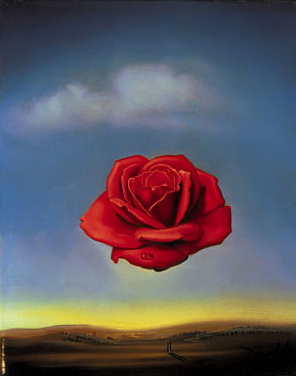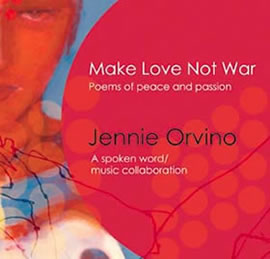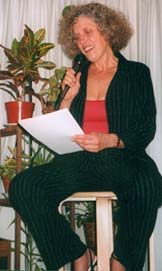
The Slow Trains Ten
writers on the creative life
featuring Jennie Orvino
Performance poet Jennie Orvino's CD, Make Love Not War, explores the body erotic and the body politic in collaboration with some of the San Francisco Bay Area's most accomplished musicians. These "poems of peace and passion" combine open-hearted sensuality and a challenge to the political status quo.
National Book Award-winning poet Robert Bly wrote of her third book, Heart of the Peony: "These poems don't dance around at the edge of town, they head straight for the center." About one of her erotic vignettes, Christopher Saint observed, "Like a sock in the solar plexus, it took my breath clean away!"
 Orvino's work has been published at Clean Sheets, Slow Trains, The New York Quarterly, First Leaves, WestWord, Human Awareness Institute Community Journal, Sacramento News and Review, Sonoma Poets Collection II, and Good Vibrations' Sex Toy Tales. She received the Don L. Emblen Literary Award (2000), and first prize for poetry in the 2001 edition of Copperfield's Books Literary Review, The Dickens. Her poem "Speak and Doublespeak" was nominated for a Pushcart Prize in 2002.
Orvino's work has been published at Clean Sheets, Slow Trains, The New York Quarterly, First Leaves, WestWord, Human Awareness Institute Community Journal, Sacramento News and Review, Sonoma Poets Collection II, and Good Vibrations' Sex Toy Tales. She received the Don L. Emblen Literary Award (2000), and first prize for poetry in the 2001 edition of Copperfield's Books Literary Review, The Dickens. Her poem "Speak and Doublespeak" was nominated for a Pushcart Prize in 2002.
In addition to being a purveyor of the spoken word, Orvino has worked as a journalist, editor, graphic designer, print production manager, and teacher. Her performance credits range from theatrical stage and coffee house to intimate living room salons, and have included collaborations with drummers, actors, jazz singers, and a variety of musicians.
1. When did you start writing poetry?
I like to say it was when I first got a diary with a lock and key at age 15. But I think I wrote my first real poem the summer I was 14 and in love with a blue-eyed, black-haired Irish boy who didn't return my affection. In those days, the boys liked to whack us on the head when our hair was set in brush rollers. (Don't ask me why we appeared in public like this). This kind of attention was supposed to mean they liked us. At any rate, matters of love, requited and unrequited, continue to be part of my subject matter.
2. What is your writing routine like?
Most important to my writing has been cultivating my attitude toward it. I want to approach it with excitement as one would approach a weekend at an exotic locale with a much-desired lover. But often I burden myself with anxiety and obligations. I have a sign on my mirror with the question: "Is what I am doing making me more relaxed and prone to writing?" Often I measure my daily choices against that standard.
Some of my best inspirations have come as soon as I open my eyes in the morning, so if I have the luxury of staying in bed for a while and just free-writing, I do. I write in my journal every night, and also read before I sleep. I want these good writer's habits to be last and first in my consciousness. Physical activity like a long walk or going to the gym and getting in a few miles on the stairmaster gets oxygen to my brain and makes me want to write. The challenge is to get home and do it before other things intervene. Often I will use writing email letters as a way to get my fingers moving, and put myself in the realm of intimate, honest communication which is the key to my voice in writing.
3. Who are some of your favorite writers, and why?
I like to read about the art and craft of writing. My influences have been many: Natalie Goldberg's books, especially Wild Mind; Annie LaMott's Bird by Bird; Julia Cameron's The Artist's Way; Stephen King's On Writing; Bill Moyers' book of interviews with poets, called The Language of Life; Mary Oliver's A Poetry Handbook; Your Life as Story by Tristine Rainer; the screenwriting classic, Story by Robert McKee; The Art of the Personal Essay edited by Phillip Lopate; Susie Bright's How to Read/Write a Dirty Story.
I think one should read what one wants to write. When I want to write a poem, I read poets. I've always been inspired by Sharon Olds; she is a poet I find absolutely breathtaking sometimes, and I admire her as a teacher also. I've been reading Billy Collins (our current U.S. Poet laureate), Robert Hass, and Jane Hirshfield in the past few weeks. There are friends and local poets I also admire very much: Bill Noble, Dorianne Laux, Thomas Centolella.
When I want to write erotica, I read the many many anthologies I have collected: Best American Erotica; Full Frontal Fiction; From Porn to Poetry.Thomas Moore's The Soul of Sex was deeply inspirational for my writing.
I read non-fiction too, mostly personal growth/sexuality works; and progressive magazines and newspapers to keep me politically informed.
4. Besides writing, what are you most passionate about in your life?
When I was 21 years old, I wrote in one of my diaries, "I think it is my calling to write poetry and work for peace." I still stand by that mission statement. I am committed to transformative work in the area of social justice and world politics. Alternative media, especially community radio, is where I give my time and my money. I am passionate about working for change, one mind and heart at a time. I love performing my poetry. I love collaborating with musicians and other artists on creative projects. Since 1995, I have been teaching/learning about love, intimacy, and sexuality through a terrific organization called the Human Awareness Institute(HAI).
Other than that, I love to cook for company and ride horses. Neither of which I do that often, but when I think of how I would like to spend the last day of my life, if it could be anything at all in any locale, it would certainly start off with a nice strong mocha, a gallop across the meadow with the snow-covered mountains in the distance, and a great dinner with friends.
5. What kind of music do you enjoy, and do you find that music has an influence on your writing?
I like jazz, I like dance music. I love to dance! I enjoy live music in a sophisticated setting. I notice I don't have music playing in my house a lot. Quiet really is appealing. I'm very sensitive to unpleasant sounds: leaf blowers, neighbors arguing, dogs barking, sirens, low-flying planes. I might put music on when I'm cleaning or doing some other chores when I need rhythm and encouragement. I used to play drums and percussion, and I think I enjoyed that more for the collaborative and community aspect of playing music with other people than for the music itself. I don't like to practice. However, I've loved many musicians throughout my life, and that has had an influence on my writing!
6. Where are your favorite places to travel?
I like warm places, beaches. I'd go back to Hawaii dozens more times. I loved going to Italy, my ancestral home, although I was only in Tuscany. There are dozens more places in Italy to experience, like my grandfather's town of Nola near Naples and the island of Capri. I'd like to live in Italy a while and get my language skills up. My daughter lives in New York City, so that has become a place I find exciting to visit (but I wouldn't want to live there). I'm not fond of travelling alone for the adventure of it; I like to be on my way to see friends or relatives, to know someone is at the other end to meet me when I get off the plane.
7. Where do your best ideas come from, or, what creates your most inspired state?
Twice in the past year, I've had the occasion to house-sit on the Mendocino County (California) coast, about two hours from where I live. It's the home of a writer who has no computer or television, but the most fantastic library and the most fantastic view of the ocean. I can't see neighbors in any direction, the house has wrap-around decks for sunset observation, and a beautiful kitchen with good knives and my kind of condiments. The 2.6 mile round trip walk to the mailbox is on a road through several stretches of peaceful woods, and my only duties are to water plants and feed the cat. This opportunity has created some very healing and inspired states.
Putting aside special "retreat" circumstances, I get inspired by being truly present to my experience and by working with my personal coach, David Brownstein of hollywoodcoaching.com. For the past year, this once-a-week 30-minute session has brought up the right questions and given me the "opening" and support I need to allow creativity to flow.
8. Do you have any interesting vices that you'd like to share, and have they helped or hindered your writing?
Me, vices? I'll admit that I feel smarter and my clothes fit better when I'm making love regularly. I think worry is my worst vice; the second worst is depreciating self-talk. I call myself an idiot, I swear an awful lot when I'm alone. I say "fuck it" more than I should. I hate hate hate to be called a bitch but sonofabitch is my "really angry" phrase of choice. Anxiety and lack of trust in my process hinder my writing.
9. Yeats said that the only things worth writing about are sex and death -- what would your list include?
I haven't been successful writing about death. Some of my writing teachers see this as a flaw, that I need to learn more about paradox, the shadow. They say, everything isn't orgasmic. It isn't?? I think that anything is worth writing about if it is filtered through an aware consciousness. I learned this from reading Billy Collins; I learned this from hearing the work of our former local poet laureate who is ageless and energetic in his eighties. He wrote a most amazing poem from observing life around him while waiting in line at a copy shop. If I look at my work and its themes of war/peace, sexuality/relationships, self-actualization/service, the key to exploring it all is passion and curiosity. That is what I want to cultivate.
10. What's next for your writing?
I need to put together a small manuscript for Don Emblen's Clam Shell Press "Writers Sampler" series. Don sets type by hand and prints a limited edition on his letterpress. The little books are bound with thread, and he tells me I can help sew the edition of 100. I can learn to set type if I want to. I thought the theme of "Obsession" would be good for the 6-8 poems in the sampler, but the poems aren't finished yet.
I'm trying to write some personal essays. I've been interested in this for years but I have been reluctant to write prose, the idea of 20, 30 40 pages just scares me. I read an article by Gregory Orr in Poets and Writers that said the personal essay is a perfect form for the lyric poet who wants to blab because "it so generously accepts the subjectivity of speculation and imagination that poets thrive on."
Other than continuing to perform and promote my CD, that's what next.
I need to do the thing that scares me.
©2002 by Jennie Orvino




 Orvino's work has been published at Clean Sheets, Slow Trains, The New York Quarterly, First Leaves, WestWord, Human Awareness Institute Community Journal, Sacramento News and Review, Sonoma Poets Collection II, and Good Vibrations' Sex Toy Tales. She received the Don L. Emblen Literary Award (2000), and first prize for poetry in the 2001 edition of Copperfield's Books Literary Review, The Dickens. Her poem "Speak and Doublespeak" was nominated for a Pushcart Prize in 2002.
Orvino's work has been published at Clean Sheets, Slow Trains, The New York Quarterly, First Leaves, WestWord, Human Awareness Institute Community Journal, Sacramento News and Review, Sonoma Poets Collection II, and Good Vibrations' Sex Toy Tales. She received the Don L. Emblen Literary Award (2000), and first prize for poetry in the 2001 edition of Copperfield's Books Literary Review, The Dickens. Her poem "Speak and Doublespeak" was nominated for a Pushcart Prize in 2002.
